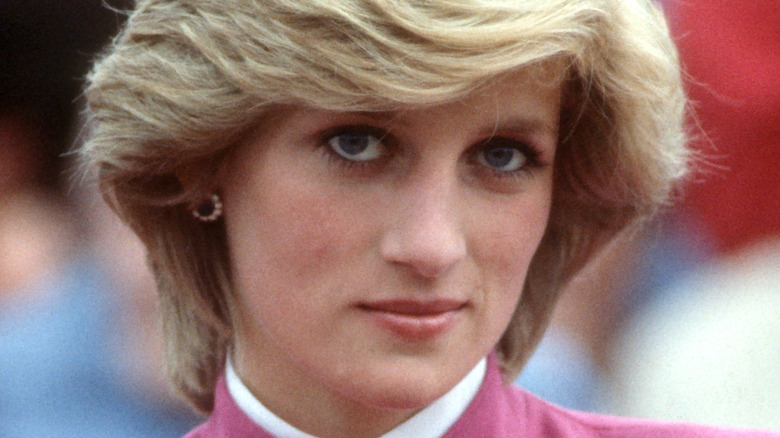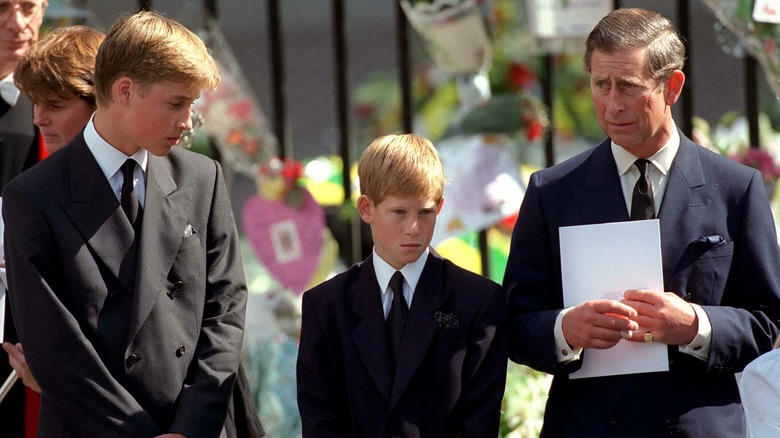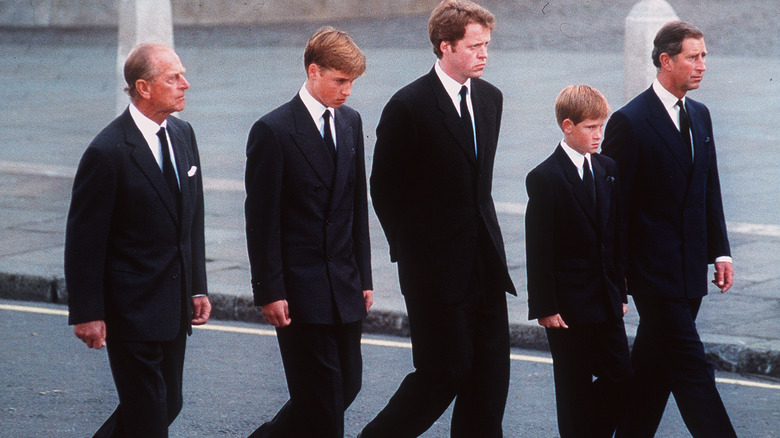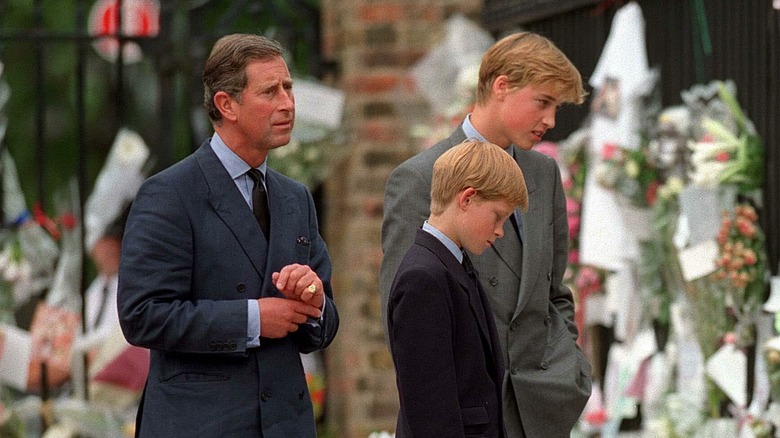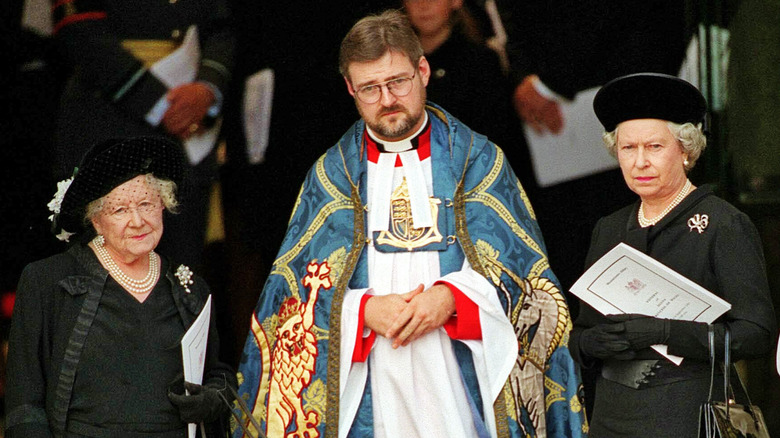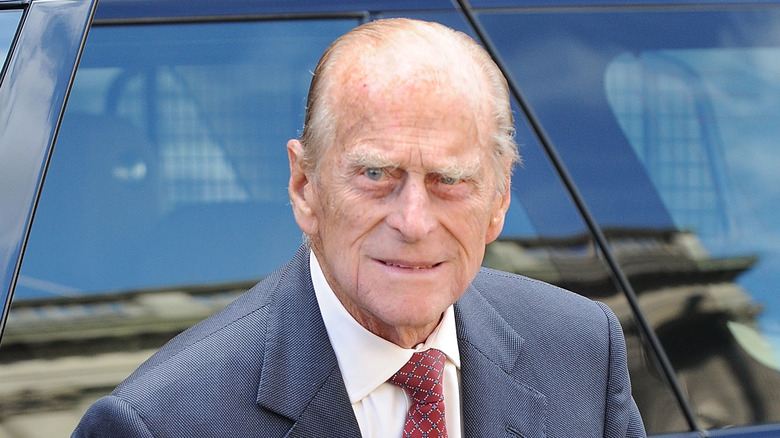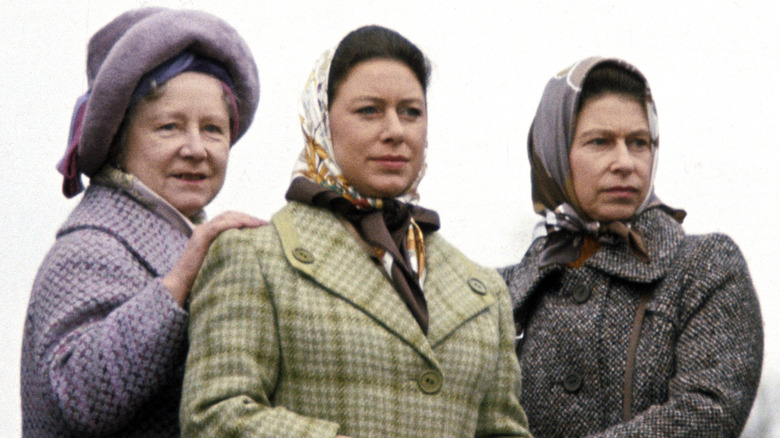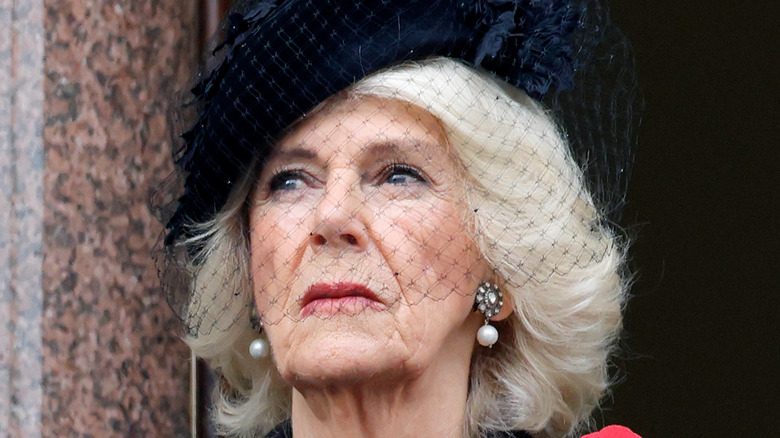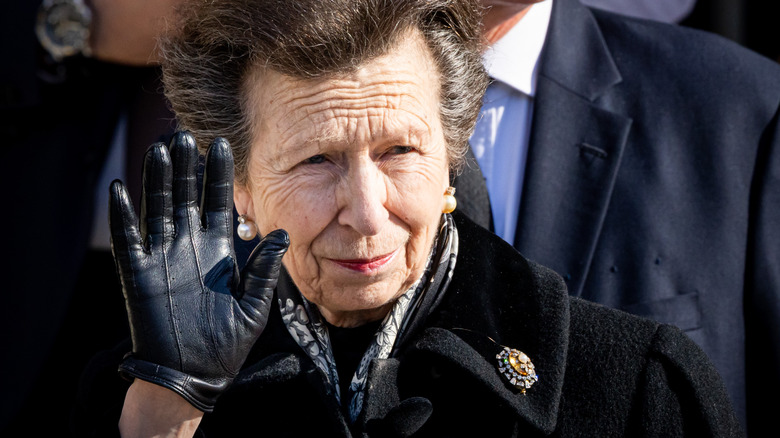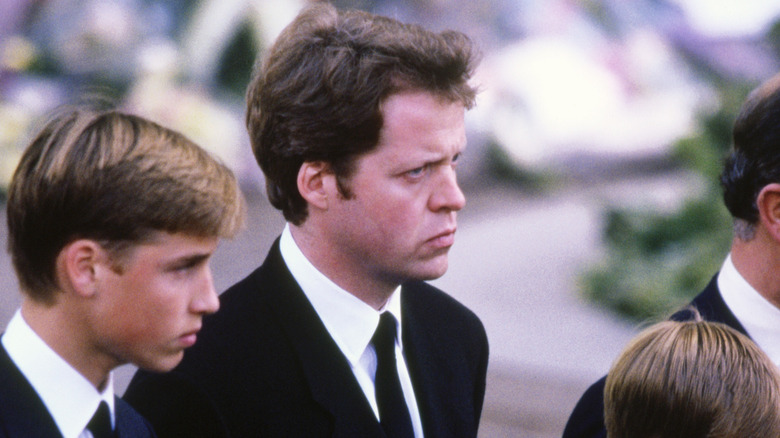How Royals Reacted To Diana's Death
With Prince Harry's new tell-all book "Spare" shaking every corner of the royal news world with its personal revelations and breaking the Guinness World Record for the fastest-selling non-fiction book of all time, we're reliving the tragic death of Diana, Princess of Wales, all over again. The summer of 2023 marks the 26th anniversary of her death, and there's so much life that's happened for the royal family since then — royal weddings, divorces, the birth of a new generation of royals, and the death of the longest reigning monarch England has ever known (via The New York Times).
Princess Diana, who would have been 62 years old in 2023, holds the enduring legacy of fashion icon, a patron to so many charities, and "the people's princess" — a title popularized by former U.K. Prime Minister Tony Blair (via CNN). "Though her own life was often sadly touched by tragedy, she touched the lives of so many others in Britain [and] throughout the world with joy and with comfort," he stated during a speech (via YouTube). "She was the people's princess, and that's how she will stay ... in our hearts and in our memories."
With 26 years worth of new insights, information, and personal anecdotes to share, we're taking a fresh look at how the death of Britain's most beloved princess impacted each member of the royal family, in public and behind closed doors.
Young Prince Harry tried to bury his shock and grief
Prince Harry, who was only 12 at the time, has said he remembers the events surrounding his mother's death in vivid detail. In his memoir "Spare," he described his last interaction with her over the phone. "She'd called early in the evening, the night of the crash, but I was running around with Willy and my cousins and didn't want to stop playing. So I'd been short with her. ... I wished I'd apologized for it," he said (via Page Six).
According to the book, when King Charles delivered the bad news, Prince Harry said he had a hard time accepting she wouldn't be coming home. He also expressed he had a hard time attending the public procession, which was less than a week later (per Westminster Abbey). "My mother had just died, and I had to walk a long way behind her coffin, surrounded by thousands of people watching me while millions more did on television," he said (via Newsweek). "I don't think any child should be asked to do that, under any circumstances."
In his memoir, Prince Harry broke down in tears once Princess Diana was finally buried. "I felt ashamed of violating the family ethos, but I couldn't hold it in any longer," he wrote (via BuzzFeed). Apparently, this is one of the last times he openly expressed his grief; during a "60 Minutes" segment with Anderson Cooper, he confirmed he hadn't cried in years (via CBS).
Young Prince William put on a brave face
Like young Prince Harry, the then-15-year-old Prince William was in disbelief over the news of his mother's death. "I remember just feeling completely numb, disorientated, dizzy," he said (via ABC). "You feel very, very confused. And you keep asking yourself, 'Why me?' All the time, 'Why? What have I done? Why? Why has this happened to us?'" The young prince reportedly used the last few days in Scotland, where the boys first learned of their mother's accident, to sit with his feelings and find comfort in his surroundings (per People).
Prince William, like his brother, then marched dutifully along with the funeral procession, despite it being "one of the hardest things I've ever done" (via Marie Claire). In the end, he took a slightly different approach to grief than his brother. Where Prince Harry shut down his feelings, Prince William compartmentalized. "[There's a] balance between me being Prince William and having to do my bit, versus the private William who just wanted to go in a room and cry because he'd lost his mother," he explained (via ABC). He went on to say that he didn't want her to be remembered as the cause of their grief, but for the loving mother and accomplished woman that she was in life. "I wouldn't let it break me. I wanted it to make me. ... If I can be even a fraction of what she was, I'll be proud."
King Charles III was suffering behind the scenes
According to Christopher Andersen, author of "The King: The Life of Charles III," King Charles let out "a cry of pain was that so spontaneous" after receiving the news of Princess Diana's death and "collapsed in an armchair, weeping uncontrollably." Anderson wrote: "I don't think people realize how really stricken he was by her death."
The king was reportedly also deeply concerned about the well-being of the monarchy and Camilla, Queen Consort (then-Camilla Parker Bowles) who had been given all kinds of derogatory labels by the press and public at the time. Royal expert Tina Brown told The Washington Post: "There was a great campaign by Charles to sort of introduce her [Camilla] gradually to the public after the divorce from Diana. And then what happens? Diana dies. ... She's [Camilla's] driven underground again, because at that point, she's also public enemy number one." One of King Charles' former employees told the Daily Mail: "He was in genuine agony about what she was putting up with."
After the initial shock and emotion passed, King Charles apparently "snapped into action and made sure the queen gave Diana the proper sendoff" (via Fox News). On the phone and in public, King Charles became all business. Prince Harry recalled his father's somewhat distant attitude at the time "Pa didn't hug me. He wasn't great at showing emotions under normal circumstances" (per "Spare" via CBS).
Queen Elizabeth II broke protocol to put family first
When the late Queen Elizabeth learned of Princess Diana's death while in Scotland, she didn't immediately hop on the next flight to England. According to The Washington Post, Britons were angry with the queen when she didn't release a statement or return to Buckingham Palace to publicly mourn right away. However, Tina Brown, author of "The Diana Chronicles," suggested she had a good reason to stay away. "The Queen was adamant that her place was at Balmoral with her grieving grandsons," said the author (via Express). "Her thoughts were with her grandchildren and she wasn't thinking about how this would be played out in the media." A letter written by Queen Elizabeth at the time also corroborates this sentiment. "It was indeed dreadfully sad, and she [Diana] is a huge loss to the country," wrote the queen (via ABC). "William and Harry have been so brave and I am very proud of them."
When she did return to the palace to pay her respects, she broke protocol twice to honor the late Princess of Wales. The night before the funeral, Queen Elizabeth delivered a televised address, in which she expressed her admiration for Princess Diana. "What I say to you now, as your queen and as a grandmother, I say from my heart," she stated (via YouTube). "She was an exceptional and gifted human being." Additionally, during the funeral procession, the queen was famously spotted bowing at Princess Diana's coffin.
Prince Philip was there for support
Though the late Prince Philip, Duke of Edinburgh is often remembered for his blunt attitude, he was also known to be a supportive grandfather. As Tina Brown detailed in her book, "The Palace Papers", "the Spencer side had been saying what the role of the children had to be [in the funeral]. Philip suddenly blasted, 'Stop telling us what to do with these boys! They have lost their mother!'" (via Town & Country). When Prince William and Prince Harry were ultimately requested to walk behind their mother's coffin for the public service, their grandfather allegedly chimed in with a few words of support: "If I walk, will you walk with me?"
The Duke of Edinburgh also apparently made an effort to support Princess Diana during the years leading up to her divorce from King Charles. Madame Lucia Flecha de Lima, a friend of Princess Diana, said Prince Philip "drew on his own experiences" to offer the Princess of Wales marriage advice. She told the Daily Mail: "I personally read around half a dozen of the letters from Prince Philip. Diana let me see them. And although they were tough, it was clear to me he was trying to be constructive. ... Philip felt Diana and Charles did not have to be divorced. They could live separate lives, with separate apartments, if necessary, but they could remain together."
Princess Margaret was stunned by the public's reaction
According to Gareth Russell's book "Do Let's Have Another Drink! The Dry Wit and Fizzy Life of Queen Elizabeth the Queen Mother" (via Newsweek), Princess Margaret didn't have a great liking for the Princess of Wales, but "felt desperately sorry for Diana's sons." Though the queen's sister attended the funeral alongside the rest of the royal family, she didn't bow along with the crowd as Princess Diana's coffin passed by (via YouTube).
When the public flocked to Buckingham Palace to pay their respects to "the people's princess" that week, they left a tribute of about 15,000 tons of flowers — which is still the largest floral tribute ever, according to the Guinness World Records. The queen's mother and Princess Margaret apparently were shocked by the sheer number of grieving Britons who showed up to honor Princess Diana. As Russell wrote, Princess Margaret in particular "had no sympathy for the public's mood" (via Newsweek). He went on to say: "She told a friend that the reaction was unhinged, 'rather like Diana herself. When she died, everyone got as hysterical as she was.' ... She complained about the smell of the mountains of decomposing flowers left at the palaces across London, referring to them as 'floral fascism.'" Princess Margaret died in 2002 at 71 (per People), leaving the royal family to grieve again only five years later.
Camilla, Queen Consort was blamed, in part, for Princess Diana's death
Camilla Parker Bowles became queen consort following Queen Elizabeth's public announcement on the subject and King Charles' accession to the throne in 2022, but she was once seen as a pariah by the royal family and the public. The queen consort had been in King Charles' life since the 1970s, from lover to friend and back again, even after the then-prince had married then-Lady Diana Spencer (per Today). According to an archived article by The Washington Post, her role as King Charles' mistress from that point on "made Camilla suddenly the most hated woman in Britain." Journalist Diana McLellan wrote: "She was perceived as a man-killer, a b***h, the desecrator of the fairy tale marriage that had captured the hearts of the world."
After Princess Diana's fatal car accident, the public blamed the queen consort, and the British press came knocking at her door. One woman said (via The Washington Post) that "without the mistress, none of this would've happened." Despite the accusations made against her, the queen consort appears to have made every effort to honor Princess Diana and support King Charles. She reportedly comforted King Charles over the phone the night of Princess Diana's death and was genuinely shaken by what had happened (per the Daily Mail).
Princess Anne supported the queen's decision to keep the young princes at Balmoral
Though Princess Anne and Princess Diana didn't have the closest relationship, apparently "Diana's death really got to her" (via New Idea). One source said that "Anne was very disgruntled by Diana going on-air and talking about how she had depression and how awful it was for her to be part of the family. ... But when it all came out that Diana had been conned, and how miserable she truly was, Anne was devastated. She worries that she failed Diana, who could have used a strong woman to support her."
Princess Anne felt the royal family's choice to grieve privately at Balmoral was for the best. "I think my mother did exactly the right thing," she said in an interview (via ITV News). "I think it's absolutely extraordinary that any right-minded-thinking parent should believe that it would have been an alternative to bring those children down here to London in all that hoo-ha. ... I don't think either of those two [children] could have really been able to cope." She also acknowledged how difficult it was for the boys to adjust to the devastating loss of their mother. "Little time that they had, which was never going to be very much, to try and come — even in a fleeting sense — to terms with what had happened," she added. "It's not possible for most people to do that in that space, never mind children of that age."
Charles Spencer tried to be a voice for his sister
In 2017, Princess Diana's brother Charles Spencer reflected on how devastated he was by her passing, especially during the funeral. "The feeling, the sort of absolute crashing tidal wave of grief coming at you as you went down this sort of tunnel of deep emotion, it was really harrowing and I still have nightmares about it now," he said (via The Guardian).
He also expressed dismay over his nephews having to walk behind their mother's coffin, which he noted was already enormously painful for him: "There was the inner turmoil of thinking, 'My God this is ghastly', but then the point of thinking these two boys are doing this and it must be a million times worse for them." Spencer had apparently objected to the boys having to make the long walk and told the palace liaison: "She [Diana] just would not want them to do this" (via the BBC). "Eventually I was lied to and told that they [Prince William and Prince Harry] wanted to do it, which of course they didn't."
In his famous eulogy speech, which caused the whole hall and the throngs of people outside to applaud, he simply said he wanted to "speak for somebody who had no longer got a voice" (via The Guardian). He added: "I was trying to celebrate Diana — and if by doing that it showed up particularly the press, I think, in a bad way, well, they had that coming."
